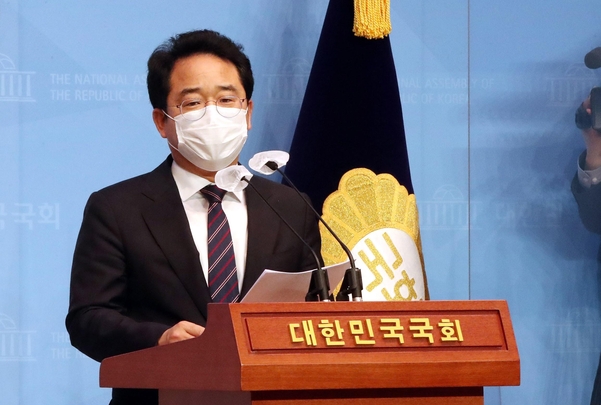Input 2021.01.25 17:10
The former Min Byeong-deok initiative sparks controversy… “Bank supports 25 trillion won per month by purchasing government bonds”
The 10-year Treasury Bond interest rate approaches 1.8%… 1 year and 2 months 來 rise to the highest
The market line is criticized at once… “Anxiety about inflation and exchange rates following infringement of independence”
Controversy is intensifying as the Bank of Korea has been pointed out as the main body of financing for loss compensation for self-employed and small business owners. In addition, this is because the Democratic Party mentioned the BOK’s acquisition of government bonds (direct purchase) while proposing a bill that would cost 24 trillion won per month and approximately 100 trillion won per four months.
Monetary policy experts are criticizing that the issue of independence of central banks could spread, saying that politicians are actually forcing “quantitative easing”.
If the loss compensation system proceeds according to the ruling party’s proposal, it is highly likely that the problem will not stop at the central bank line. If the government releases enormous funds secured by the BOK’s purchase of government bonds, this will immediately lead to an increase in the amount of money. In addition to the possibility of inflation, it is possible to see a rise in the exchange rate due to the depreciation of the currency. At the moment, the interest rate on KTBs rose to the highest level in one year and two months, reflecting these concerns. The BOK maintains a cautious stance while sticking to the negative stance on the’monetization of debts’ that bears government debt.

The bond market began to be shaken as the ruling party began to discuss the loss compensation system for self-employed people. On the 22nd, a day after Prime Minister Jeong Sye-gyun officially ordered a review of the institutionalization plan for loss compensation on the 21st, the 10-year Treasury Bond yield rose by 0.052%p to 1.758% on the 22nd. Treasury bond yields also affect banks’ lending rates, so a rise in government bond yields is a factor in increasing market interest rates.
Yoon Yeo-sam, a researcher at Meritz Securities, said, “There is a concern that the BOK can cover all the issued government bonds assuming the implementation of the loss compensation system.” .
In particular, the controversy over how to raise funds is intensifying. The bill announced by Democratic Party lawmaker Min Byeong-deok set fire. Congressman Min’s bill included compensation for an amount within 70% of lost sales in the case of businesses prohibited from collectively, and within 50-60% for others. The amount of funds required is up to 24.600 trillion won per month and 100 trillion won in four months.
The bill pointed to the BOK’s purchase of government bonds as a financing plan. “The state issues government bonds to cover the financial resources of compensation for losses and consolation funds, the BOK purchases the issued government bonds, and the purchase amount is paid to small business owners and citizens after transfer to the government.” It contains a plan for the BOK to purchase directly from the issuing market rather than the distribution market.

The central bank’s direct purchase of government bonds was used as a method of quantitative easing after the global financial crisis in 2008, but it is believed to be the last financing method. It is the first government financing tool used by Japan during the’Lost 10 Years’ in the 2000s. The Bank of Japan (BOJ) is paying off by taking over government bonds issued by the government, and in April last year it abolished the government bond purchase target system. This is to expand the purchase of government bonds as required by the government. Japan’s national debt ratio has risen more than 230% of its GDP (Gross Domestic Product), and the central bank’s takeover of government bonds is playing a part.
However, experts agree that it is difficult for Korea to indiscriminately follow the Japanese-style fiscal policy that made the central bank take over the government fiscal policy in a financial environment that is not a key currency like Japan. In particular, he points out that the discussion should not be unfolded in a way that is swayed by the politics in a situation where there is no social consensus on the loss compensation system. The politics’ influence on the central bank’s mobilization of issuing power is highly likely to lead to controversy over’independence’.
If the government supplies enormous funds to the market at once through the purchase of government bonds from the BOK, side effects are not easy. At the moment, when the government supplies funds to local governments, households, and businesses, it is immediately caught as a consultative currency (M1) that can be converted into cash. Experts are concerned that the inflation problem expected after Corona 19 may be further aggravated, and that exchange rate problems such as a plunge in the value of the won may arise due to the fall in currency value.
So-young Kim, a professor of economics at Seoul National University, said, “The amount required for the loss compensation system is excessive, and the side effects will be too severe even if you go outside the central bank-level problem.” I said.
The BOK has not shown any official reaction to the funding of the loss compensation system. However, Governor Lee Ju-yeol has clarified a negative position on the’monetization of debts’ that the central bank covered the government’s debts in the past. In October of last year, he attended the National Assembly’s Planning and Finance Committee, and said, “If the financial market is temporarily unstable due to inconsistency between supply and demand, we plan to purchase government bonds to stabilize the market.” ‘There is no plan to go to the’, he drew.
A number of BOK officials said, “It can be considered the same as the position that the governor previously expressed,” and “Now that the bill has been proposed, we have to watch the progress further.”
